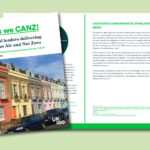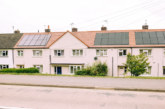Local authority Net Zero and clean air policies need to be aligned to save lives and taxpayers’ money, according to a new report from UK100, released ahead of Clean Air Day (16th June).
UK100 is the UK’s only network of climate ambitious local and regional leaders committed to delivering Net Zero ahead of the Government’s 2050 target and tackling air pollution.
The report, Yes We CANZ: Local leaders delivering Clean Air and Net Zero, introduces the concept of “Clean Air Net Zero” (CANZ) — ensuring Net Zero policies include a clean air audit and vice versa.
It argues not enough has yet been done to learn from the mistakes that led to ‘dieselgate’, where diesel vehicles were promoted across Europe as a climate-friendly option without regard to the increase in deadly air pollution emissions associated with diesel combustion.
Identifying the “wins-wins” to be gained from a CANZ approach, the report calls on local authorities to:
- Support a transport shift away from private car reliance
- Make homes warmer through insulation and energy efficiency measures while switching to fossil-fuel-free heating systems
- Work with the agricultural industry to support less intensive farming and reduce the level of ammonia emissions
- Empower local communities to make informed choices with more data transparency and access
Ultimately, tackling Net Zero and clean air together would save lives and money, according to the report. The benefits of action to bring air pollution levels in line with World Health Organisation targets would boost local and regional economies by £1.6bn a year.
At the same time, however, the report highlights a handful of policy areas where a careful balance between the clean air and Net Zero agendas is necessary.
The challenges outlined in the report include:
- Balancing the carbon emission reductions linked to “low carbon” heating fuels, like biomass and hydrogen, with the negative impacts on local air quality
- Learning the lessons of dieselgate and carefully considering which vehicles are most beneficial overall as the UK transitions away from petrol and diesel-only vehicles
- Understanding the unintended consequences of poorly designed tree planting and green infrastructure policies
- Considering the trade-off associated with airtight energy efficiency schemes and the ventilation needs to improve indoor air quality
Welcoming the findings, Polly Billington, Chief Executive of UK100, said: “While it might feel like the scandal is firmly in our rearview mirrors, one of the most important lessons of ‘dieselgate’ was that we cannot and must not divorce clean air and climate policies. Our new report demonstrates that acting on these issues together is easier than some might think.
“With local authorities the best placed to deliver effective climate and clean air action, our report finds Clean Air Net Zero (CANZ) presents a series of win-win opportunities to support local and regional leaders to align the two agendas. From public transport to clean heating; from energy efficiency to farming, clean air and Net Zero goals are inexorably linked.
“Aligning clean air and climate policies will save lives and money while accelerating Net Zero progress. And that’s why we’re calling on the government to give local authorities the support they need to avoid past mistakes and deliver cleaner air, warmer homes and a more secure future for their communities.”
The report features a series of case studies from local authorities up and down the country leading the way in aligning clean air and Net Zero, including; Birmingham City Council’s Clean Air Zone, The London Borough of Camden’s adoption of the WHO air quality target, Gloucestershire County Council’s GREAT farming project, Sheffield City Council’s air quality data project, Leeds City Council’s Clean Air Zone planning, The City of Edinburgh Council’s new Low Emissions Zone, Lancaster City Council’s solar-powered leisure centre, South Tyneside Council’s air quality planning requirements, Cornwall Council’s adoption of doughnut economics, and the Greater London Authority’s implementation of building regulations to promote energy efficiency.









